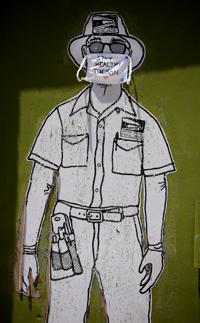PHOENIX т Landlords and mobile home park owners from around the state are asking the УлшжжБВЅ Supreme Court to void an executive order by Gov. Doug Ducey blocking evictions of tenants who do not pay their rent.
Their lawsuit claims the governor lacks the constitutional authority to tell constables around the state not to process eviction orders, even those issued legally by judges. It also contends that Duceyтs directive is violating the property rights of landowners as well as their right to enter into contracts.
In seeking review, the lawsuit acknowledges that the governor can exercise certain powers in a public health emergency. But attorney Kory Langhofer, who prepared the legal filing, said Ducey, in unilaterally barring landlords from enforcing the terms of lawful lease agreements, created тan indefinite economic welfare and redistribution program, rather than a public health measure to contain the COVID-19 contagion.т
People are also reading…
Langhofer also told the justices that if the governorтs order goes unchallenged, тthen there is virtually no personal or commercial transaction or conduct that would lie outside his grasp.т
The lawsuit asks the high court not just to rule that Duceyтs order exceeds his constitutional authority, but to specifically direct constables and justices of the peace to carry out their duties to evict tenants once there is a finding they are not paying their rent.
In previously defending the order, the Governorтs Office has argued that nothing in it eliminates the legal duty of tenants to make up the missed rent once the emergency ends. But Langhofer said eviction generally is a landlordтs only effective remedy when someone doesnтt pay.
And he called the end-of-emergency obligation to pay little more than тparchment promisesт by tenants, who probably canтt pay anyway, making the requirement to come current on rent тan illusory means of redressт for landlords.
When the governor issued the original order in March, there was a promise that the state would provide financial assistance to renters, said Courtney Gilstrap LeVinus, president of the УлшжжБВЅ Multihousing Association, one of the groups that sued. So she said her members decided not to challenge the order.
But to date, less than $2 million has gone out, which is nowhere near enough, she said.
тHad those funds been deployed, we may not have needed to file,т Gilstap LeVinus said. тThere are plenty of resources out there. No one should be evicted.т
Complicating matters, Ducey last month extended the no-eviction order through the end of October.
He did add a provision that requires tenants to certify to landlords by Aug. 22 they have applied for rental assistance from one of the state, county, city or private organizations that provide it. But there is no requirement they actually have received the money by then.
Ducey also set aside $5 million in grants for landlords, though aides to the governor said these were designed mainly to help those with one or just a few properties and not for owners of apartment complexes.
Gilstrap LeVinus said that will hardly be enough to compensate landlords for lost revenues.
Legal issues aside, she said itтs not fair to put the burden of the financial problems caused by the pandemic largely on the backs of landlords.
тWhen the pandemic hit, the state didnтt mandate that grocery stores and restaurants give away free food or that gas stations give away free fuel,т Gilstrap LeVinus said. тYet in this case, theyтre asking rental housing owners to provide free housing.т
And she pointed out that, by the end of October, landlords could have been without rent т and without ability to evict non-paying tenants т for 221 days.
тThere is no industry that can continue to provide goods and services for 221-odd days and be expected to survive,т she said.
How much is owed is unclear.
She said the only data comes from a national organization that says more than 20% of renters had not paid their August rent as of the sixth day of the month. And that looks solely at information from major landlords.
Economist Elliott Pollack, in a study done for the УлшжжБВЅ Multihousing Association, figures that if just 1% of the more than 919,000 УлшжжБВЅ households that rent did not make payments over a seven-month period, that means a loss of more than $67.7 million. Take that figure to 15%, he said, and the foregone revenues top $1 billion.
Pollack said there also is a ripple effect as landlords cannot pay their employees, contractors and suppliers.
But the heart of the issue т and the only one for the Supreme Court to decide т is whether Duceyтs action is legal.
Langhofer told the justices that the statutory provisions the governor is using for all of his executive orders allow him to exercise police powers, specifically to тalleviate actual and threatened damage due to the emergency,т and to facilitate the supply of equipment and services тto provide for the health and safety of the citizens of the affected area.т
He acknowledged the law does allow the governor to тcommandeer and utilize any property.т And that, Langhofer said, could be interpreted to include a moratorium on evictions as a means to ensure that people have housing.
But he said that exists only in a тstate of war emergencyт т and only if the governor makes provisions for compensating the owners of the property.
Langhofer said that Ducey, in issuing his executive order, acknowledged that it had little to do with protecting public health but was тprimarily an economic relief measure.т Langhofer pointed out that tenants seeking relief need not show they are infected with COVID-19 or even that they are in a high-risk category, but only that they provide documentation of тongoing financial hardship.т
Beyond that, Langhofer pointed to the lack of any link between the order and the stateтs coronavirus infection rate or any other public health metrics.
тThe expansive temporary scope of Executive Order 2020-49 implicitly confirms that it aspires to address long-lasting repercussions of the current economic recession, not contain the spread of the disease,т he wrote.
Langhofer also raises the question of whether it was unconstitutional for the Legislature to provide the governor with what could be considered unlimited emergency powers.
Photos for May 29: УлшжжБВЅ gets by during Coronavirus Pandemic
УлшжжБВЅ gets by during coronavirus pandemic

The iconic Casa Molina bull and matador statue both sport masks on the first full week of the loosening of COVID19 restrictions, May 23, 2020, УлшжжБВЅ, Ariz. The bull previously had a mask on the testicles.
УлшжжБВЅ gets by during coronavirus pandemic

Michelle Leon Cordova, right, mother, and her son Sahuarita High School senior Lino Cordova, whom is fighting cancer, wave at staff members from Diamonds Children Center, friends and the Marana Police Department during a car parade, celebrating Lino's graduation, outside of his home on May 13, 2020 in Sahuarita, Ariz. Cordova stood on the sidewalk while the team from Diamond Children Center, friends and the Marana police department gave Cordova a graduation gar parade. Cordova was given a gift basket with his favorite snacks, gift cards as well as other items he enjoys. The car parade, also, celebrated another graduating senior fighting cancer from Empire High School, Noah Nieto. Nieto, also, received a gift basket with snacks, gift cards and other items Lino enjoys.
УлшжжБВЅ gets by during coronavirus pandemic

Michelle Leon Cordova, right, mother, brings celebration balloons to a car after staff members from Diamonds Children Center, friends and the Marana Police Department celebrate Sahuarita High School senior Lino Cordova, whom is fighting cancer, graduation with a car parade outside of his home on May 13, 2020 in Sahuarita, Ariz. Cordova stood on the sidewalk while the team from Diamond Children Center, friends and the Marana police department gave Cordova a graduation gar parade. Cordova was given a gift basket with his favorite snacks, gift cards as well as other items he enjoys. The car parade, also, celebrated another graduating senior fighting cancer from Empire High School, Noah Nieto. Nieto, also, received a gift basket with snacks, gift cards and other items Lino enjoys.
УлшжжБВЅ gets by during coronavirus pandemic

Personnel from УлшжжБВЅ Medical Center line the heliport to watch A-10's from Davis-Monthan Air Force Base's 355th Wing and F-16's from the УлшжжБВЅ Air National Guard's 162nd Wing make a pass over the facility, one leg of an area wide community flyover, May 14, 2020, УлшжжБВЅ, Ariz.
УлшжжБВЅ gets by during coronavirus pandemic

Nancy Celix-Campos, right, a respitory therapist at УлшжжБВЅ Medical Center, watches the military flyover with her daughters, Giana, 12, and Jazmyn, 8, from Sentinel Peak on May 14, 2020. Two F-16 Fighting Falcons from УлшжжБВЅ Air National GuardУs 162nd Wing and two A-10 Thunderbolt II's from the 355th Wing, assigned to Davis-Monthan Air Force Base, fly over УлшжжБВЅ area hospitals to honor healthcare personnel and first responders as they are some of the frontline workers dealing with the coronavirus disease (COVID-19) head on. "It's been an exhausting two to three months," says Campos, "it's pretty cool, I like how they're going by each hospital."
УлшжжБВЅ gets by during coronavirus pandemic

Two F-16 Fighting Falcons from УлшжжБВЅ Air National Guardтs 162nd Wing and two A-10 Thunderbolt II's from the 355th Wing, assigned to Davis-Monthan Air Force Base, fly over Northwest Medical Center north of УлшжжБВЅ on May 14, 2020.
УлшжжБВЅ gets by during coronavirus pandemic

A letter carrier portrait on the Ok Market building, located in the Armory Park neighborhood, is adorned with a face mask on May 18, 2020.
УлшжжБВЅ gets by during coronavirus pandemic

Rosemary Garcia waits for a family member outside of a store at Park Place Mall, 5870 E. Broadway Blvd., in УлшжжБВЅ, Ariz. on May 19, 2020. Malls reopened today under CDC guidelines and Gov. Ducey's new rules for businesses due to the Coronavirus pandemic. Park Place Mall has signs throughout the mall reminding customers to keep a six feet distance as well as hand sanitizer stations near each entrance. About half of the tables in the food court have been removed to allow for social distances as well as less than half of the stores have opened with new guidelines. Of the stores open, only 10 customers are allowed to shop in each store at a time.
УлшжжБВЅ gets by during coronavirus pandemic

Pat Schlote steams clothing before it is put on the sales floor at the Golden Goose Thrift Shop in Catalina, Ariz., on May 21, 2020.
УлшжжБВЅ gets by during coronavirus pandemic

Ada Contreras, teaching assistant, looks through containers while reorganizing toys at Herencia Guadalupana Lab School, 6740 S. in УлшжжБВЅ, Ariz. on May 21, 2020. As Child care centers begin to re-open when they are ready, Herencia Guadalupana Lab School is reorganizing and cleaning everything in the facility before re-opening on June 2. To allow for social distancing and decrease the amount of items children touch, Herencia Guadalupana Lab School has sheds where items will go as well as placing items in containers organized by category.
УлшжжБВЅ gets by during coronavirus pandemic

Jen Martinez, right, softball coach, teaches Skylar Reilly about hitting during a session at Centerfield Baseball Academy, 5120 S. Julian Dr., in УлшжжБВЅ, Ariz. on May 21, 2020. After re-opening on Monday, Centerfield Baseball Academy has implemented new policies in response to the Coronavirus Pandemic such as wearing masks, cleaning, signage, hand sanitizer and limiting the amount of people inside the facility.
УлшжжБВЅ gets by during coronavirus pandemic

Karl Bosma, left, and George Cantua, with facilities and maintenance, lay down stickers to mark six-foot separation distance around one of the baggage carousels, part of the efforts at УлшжжБВЅ International Airport to work within the restrictions of COVID19, May 22, 2020, УлшжжБВЅ, Ariz.
УлшжжБВЅ gets by during coronavirus pandemic

A lone passenger waits for a flight near one of the shuttered restaurants in the B Gates before Memorial Day at УлшжжБВЅ International Airport on May 22, 2020.
УлшжжБВЅ gets by during coronavirus pandemic

Drew Cooper on the stage in the St. Philip's Plaza courtyard, May 22, 2020, УлшжжБВЅ, Ariz., where live music is back on the schedule.
УлшжжБВЅ gets by during coronavirus pandemic

Many people visit Tumamoc Hill during the first day of Tumamoc's re-opening in УлшжжБВЅ, Ariz. on May 25, 2020. After being closed due to the Coronavirus pandemic, Tumamoc Hill re-opened with some modifications. There are hand sanitizer stations throughout the hike to the top as well as arrows, spaced 10-ft apart, lined up and down the hill. Some runners, hikers and walkers are also wearing masks during their hike. "The steps we are taking aim to provide our community with needed exercise, connection to our beautiful desert and a sense of comfort in such a trying time, while balancing the fact that gathering as a community endangers each of us and our loved ones. This is an unprecedented challenge that we are taking extremely seriously," said Benjamin T. Wilder, director of Tumamoc Hill. Visitors are also asked to limit their group to three people and to not touch the gate at the top of the hill- a tradition for some who make it to the top. "This is a time when we need to establish new traditions and adapt in a creative manner that embraces empathy, unity, care and patience," Wilder said.
УлшжжБВЅ gets by during coronavirus pandemic

Pen Macias, artist, works on part 2 of a mural for a client on E. Broadway Rd., between S. Columbus Blvd. and S. Alvernon Way, in УлшжжБВЅ, Ariz. on May 25, 2020. Macias, known as The Desert Pen, has been working on her clients mural for the past three months. "It's the one thing I love, I have a passion for and the only thing I could be happy doing," said Macias. The mural represents her client, a single mother of four who works in the health care field. One half of the mural is dedicated to the connection between mothers and their children. The other half is dedicated to the connection between nurses and patients. The client wanted some positivity in the mural to show how nurses give a piece of themselves to their patients hence the puzzle pieces in the nurse and the patients, said Macias.
УлшжжБВЅ gets by during coronavirus pandemic

Christina Cortinas, posing at her home, May 28, 2020, УлшжжБВЅ, Ariz., with a photo of her and her mother, Catherine Rodriguez, in San Diego, 1991. Rodriguez is currently in assisted living and fighting COVID19. Cortinas hasn't seen her mother in months, the longest such span in her life.
УлшжжБВЅ gets by during coronavirus pandemic

Ruben Lopez looks through handouts while attending a Eviction Resource Fair with his family outside the Pima County Justice Court.






















